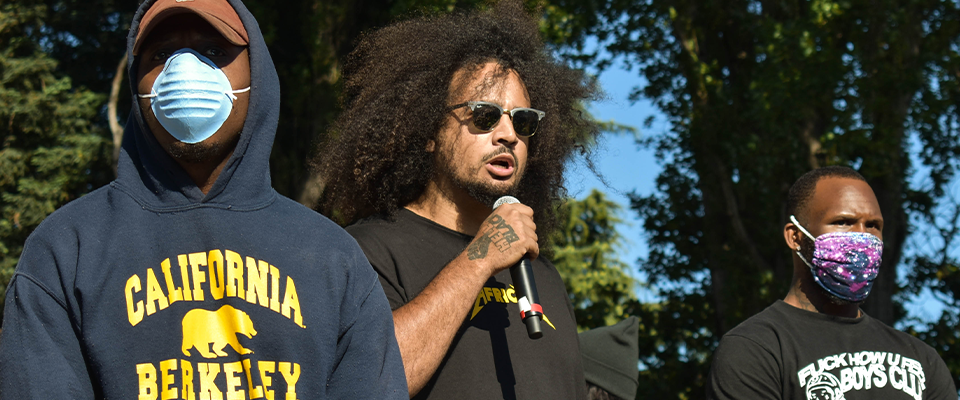Sarah Palin recently posted one of Martin Luther King’s most famous quotes on her Facebook wall: “I have a dream that my four little children will one day live in a nation where they will not be judged by the color of their skin, but by the content of their character.” And then she topped it with a zinger aimed at Barack Obama. “Mr. President, in honor of Martin Luther King, Jr. and all who commit to ending any racial divide, no more playing the race card.”
It’s exactly the kind of statement that troubles Ian Haney Lopez, the John H. Boalt Professor of Law at UC Berkeley’s law school. Lopez labels it a political dog-whistle—a message with clear racial overtones heard by those attuned to hear them, but one that allows the speaker to plausibly deny any racist intent.
Lopez explores the concept in his new book, Dog Whistle Politics: How Coded Racial Appeals Have Reinvented Racism and Wrecked the Middle Class. His argument: conservative politicians have historically relied on coded racial language to drum up support among white constituents—and they continue to use such dog-whistle tactics to snare public support for policies destructive to the middle class as a whole.
“The point of the book is not about race, per se,” Lopez says. “The point is about understanding what has happened to the middle class, and to answer that, we need to look at race.” He traces the historical roots of dog-whistle politics to the 1960s, when the success of the civil rights movement led the general public to reject open race baiting as a political tactic.

“References to racial appeal and the calls for racial solidarity didn’t disappear from public discourse—they shifted form,” Lopez says. “So you see this notion of a dog whistle, a public form of racial speech that’s operating on two levels—one inaudible where you can’t quite see that it’s racial, but on the other clearly triggering racial animus.”
One of the earliest practitioners, according to Lopez, was Barry Goldwater, the man the Republican Party nominated for president in 1964. During his campaign, Goldwater accused the federal government of trampling on states rights by forcing school integration. By linking an attack on the federal government to an attack on minorities, Lopez says, Goldwater created an essential strategy the Republican Party would use for the next 50 years.
“In 1964, conservatives discovered that their assault on a government dedicated to helping the broad middle of the American populace would fail if presented as that,” Lopez says. “But it would succeed if presented as policies to keep a white middle class from being ripped off and taxed to pay lazy and undeserving minorities.”
Here is a crudely succinct explanation from a recorded interview with the late Lee Atwater, a strategist for GOP Presidents Ronald Reagan and George Bush Sr.:
“You start out in 1954 by saying, ‘Nigger, nigger, nigger. By 1968 you can’t say ‘nigger’—that hurts you, backfires,” Atwater said. “So you say stuff like, uh, forced busing, states’ rights, and all that stuff, and you’re getting so abstract now, you’re talking about cutting taxes, and all these things you’re talking about are totally economic things and a byproduct of them is, blacks get hurt worse than whites.…‘We want to cut this,’ is much more abstract than even the busing thing, and a hell of a lot more abstract than ‘Nigger, nigger.’ ”
Reagan was adept at spinning abstract narratives like the “welfare queen” living high on food stamps, and the “young buck” buying T-bone steaks—tales that helped to garner popular support for tax cuts. “His message to people was your taxes aren’t going to support all of society, your taxes are going to lazy minorities, we need a revolt against taxes,” Lopez says. “And he got his revolt.”
That message was still resonating in the latest election, the Berkeley professors says. He noted, for example, that 2012 GOP presidential nominee Mitt Romney was surreptitiously recorded dismissing 47 percent of the country as freeloaders. “The result of that was Romney lost, but not among whites,” Lopez notes. “Romney won almost three out of five white votes. And it’s not only the case he won among white men, he also won among white women….He carried a majority of the white vote in 46 out of 50 states.”
Unsurprisingly, conservatives generally characterize this dog whistle theory as bunk.
“I can tell you that most of my fellow Republicans, especially those in leadership positions, are a bunch of cowards and don’t want to do anything that would make them vulnerable to the criticism of being racist,” says Ward Connerly, a former University of California regent and an African American.
Ian Lopez: One should understand the Tea Party as largely driven by racial sentiments.
Connerly was one of the architects of California’s Prop. 209, approved by voters in 1996 to prohibit government institutions from using race, sex or ethnicity as a factor in hiring or admissions. “The whole idea of giving different treatment or preferential treatment to anybody because of their skin color is the very definition of racism,” Connerly says. “It’s a mistake for us to call it affirmative action. It’s race-gender preferences.”
Lopez sees a coded message there as well. “Nobody should be discriminated against—this proposition sounds like a defense of neutral principles,” he says. “But the code there is that affirmative action is really a form of discrimination against whites, and it’s appealing to whites and pointing to them as the predominant racial victims of our society.”
And he says that while some Republicans are softening their racial language to gather minority votes—even a far-right conservative like Texas Gov. Rick Perry, for instance, advocates extending some social services to undocumented immigrants—not all Republicans are compromising.
Many of the fiery populists who compose the Tea Party show no signs of ditching their dog-whistles, Lopez contends—and they add a powerful religious dimension to their rhetoric to further mask racial messages.
“There is a lot of religious bigotry—people holding up placards saying, ‘I learned everything I need to know about Islam on 9/11’—but religious bigotry is serving as a cover for racial bigotry,” Lopez says. “One should understand the Tea Party as largely driven by racial sentiments.”
“Three or four years down the road, people will say, ‘wow, that strategic repeated use of the phrase Obamacare had a large racial element to it.’ ”
Such a charge exasperates the Right. Connerly balks at the notion that a conservative can be labeled racist simply for speaking out against Obama’s politics: “We should be able to oppose (the Affordable Care Act) if it’s a problem, which it is, without someone accusing you of using some dog whistle.”
Mark Steyn: The less there is, the more extravagantly the racism-awareness lobby patrols its beat.
Even Lopez admits that his Obamacare theory might seem flimsy at first glance, but he insists it sometimes takes time for people to recognize race baiting for what it is. For example, he says, it took several years before many people recognized the racial undertones of the infamous Willie Horton advertisement of 1988. Run in support of George Bush Sr., the ad critiqued Democratic nominee Michael Dukakis, the former governor of Massachusetts, for a state prison weekend furlough policy that released Horton— a convicted murderer who, while furloughed, committed assault, armed robbery and rape. The ad featured an ominous photo of the face of Horton, who was black.
Because dog whistle appeals omit explicit references to race, Lopez contends that it’s possible for conservatives to carry out this “choreography of public racism” on TV and radio shows—and that it allows not only strident protestations of innocence but also aggressive counter-attacks.
The counter-attack is simple: Racism is waning, and liberals are making mountains out of molehills. In a column for the National Review, conservative Mark Steyn argues, “The less there is, the more extravagantly the racism-awareness lobby patrols its beat.”
Other conservatives like Ann Coulter and Jonah Goldberg argue that liberals make the accusation as part of their own long-term strategy to permanently stigmatize the GOP as racist.
“It scares moderates and centrists away form the Republican Party,” Goldberg has argued, “and it no doubt helps dissuade wavering blacks from even thinking about giving the GOP an honest look.”
Lopez says social media is making it easier to identify and discuss dog-whistles when they are used, pointing to the recent Twitter campaign to get people to stop calling Seattle Seahawks defensive player Richard Sherman, a Stanford alum, a “thug.” Lopez hopes such campaigns will prevent Republicans from using dog whistles to attack progressive government—given that he views progressive government as the way to begin resurrecting the middle class.
“We know how to do this. We did it after the Great Depression, we did it in the form of New Deal liberalism,” he says. “We can do it by creating a government where the rules of the marketplace, the rules of politics, are set to help the broad middle class, not the wealthy one percent.”
Connerly agreed that the United States faces severe economic problems, and laments that many jobs have been displaced because of advances in technology. But he argues that searching for racial issues in economic problems is a waste of energy. “We’ve got problems and we need to solve them,” he says. “But you could address income and be much more effective at solving these problems than by raising these specious arguments about racism.”
Lopez couldn’t disagree more. He argues that the key to saving the middle class is buried deep within our racial problems—and that finding it will require a radical shift in thinking, similar to what happened in the 1960s. “We need a new civil rights movement that says to all Americans: Race continues to be a major social torture in our lives, and it’s harming all of us.”





















